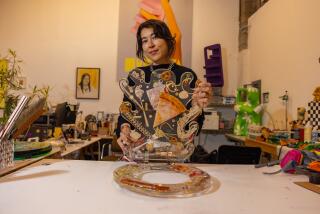Comedic Devices
- Share via
It’s such a nuisance to keep moving the footstool when you’re trying to dust a row of high shelves. Wouldn’t it be handy to have a pair of step-sandals, with tripods attached, like little stepladders on your feet to stomp around on?
Well, yes and no.
That’s the paradoxical philosophy behind Chindogu, an emerging art form that has captivated Japan and is advancing on the United States. It is a tribute, sometimes silly, sometimes brilliant, to all the inventions that are aimed at simplifying our lives--but don’t quite make it.
“The literal translation is ‘demented tool,’ ” says journalist Dan Papia, who is introducing the concept in the United States.
Known as the art of the “unuseless idea,” Chindogu was founded several years ago in Tokyo by inventor-visionary Kenji Kawakami, who has published four Chindogu books. His fast-growing International Chindogu Society has already attracted 10,000 members who have eagerly contributed their own ideas for tools that look as if they could make your everyday life more convenient but always fail the test.
Such as? The “earring safety-net cups” that strap on each shoulder and catch an earring if you lose it; a spoon with a telescopic handle that expands to reach the bottom of a deep jar; the toothbrush with bristles on both sides so you can brush upper and lower teeth simultaneously; and the tiny training wheels on high heels for teenage girls who are just learning.
“It can be seen as a parody of a consumer-driven society,” says Papia, an Angeleno who met Kawakami in Tokyo, became his collaborator and now has translated “101 Unuseless Japanese Inventions” into English.
Published in December, the book sold out so fast it is being relaunched in April, says Jenny Dworkin, a publicist at W. W. Norton & Co. She believes the Chindogu concept appeals to our innate ingenuity. “We’ve all had an idea about something that would make life easier, then thought ‘Oh, that’s too silly.’ This book encourages us to hold onto those ideas.”
Because the art of the “unuseless” is easily misinterpreted, Kawakami has drawn up 10 tenets governing Chindogu, including rules that the invention must truly exist but cannot be patented and is not for sale.
Papia is accepting membership applications (no fee, but include a G-class stamp) at 18433 Hatteras St., Suite 507, Tarzana, CA 91356.
“Anyone who submits one Chindogu is a member, whether we use it in a book or not,” says Papia, who requests that an illustration be included. One woman, he recalls, had invented an extra sink in the bathroom that he’d envisioned the usual way--side by side. But when she sent a picture, it revealed that the second sink must be strapped onto the back of the person using the first sink. Exquisite Chindogu.
More to Read
Sign up for our Book Club newsletter
Get the latest news, events and more from the Los Angeles Times Book Club, and help us get L.A. reading and talking.
You may occasionally receive promotional content from the Los Angeles Times.









